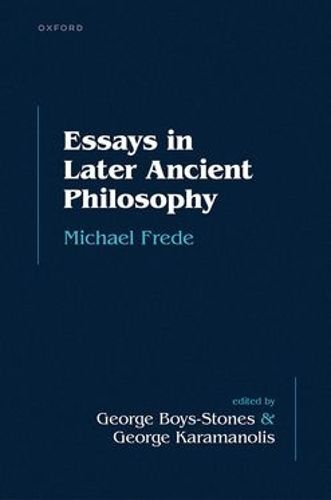Readings Newsletter
Become a Readings Member to make your shopping experience even easier.
Sign in or sign up for free!
You’re not far away from qualifying for FREE standard shipping within Australia
You’ve qualified for FREE standard shipping within Australia
The cart is loading…






Essays in Later Ancient Philosophy is a collection of Michael Frede's papers on topics in later ancient philosophy. They centre on pagan and Christian philosophers including Celsus, Numenius, Longinus, Syrianus, Origen, Eusebius, Gregory of Nyssa, and John of Damascus. In the essays, Frede shows how these figures are significant thinkers in their own right, and testimony to the vitality of philosophical thought of later antiquity. Topics covered in the volume include ethics, theology, metaphysics, and psychology. A common theme across the papers is the growth and mutual interaction of Platonism and Christian philosophical thinking from the late second century onwards. Frede shows how the period is marked by increasing engagement with philosophical authorities of the past (such as Plato, Aristotle, and Pythagoras in the case of Platonism), and with ancient traditions of wisdom on which they in turn were taken to rely.
$9.00 standard shipping within Australia
FREE standard shipping within Australia for orders over $100.00
Express & International shipping calculated at checkout
Stock availability can be subject to change without notice. We recommend calling the shop or contacting our online team to check availability of low stock items. Please see our Shopping Online page for more details.
Essays in Later Ancient Philosophy is a collection of Michael Frede's papers on topics in later ancient philosophy. They centre on pagan and Christian philosophers including Celsus, Numenius, Longinus, Syrianus, Origen, Eusebius, Gregory of Nyssa, and John of Damascus. In the essays, Frede shows how these figures are significant thinkers in their own right, and testimony to the vitality of philosophical thought of later antiquity. Topics covered in the volume include ethics, theology, metaphysics, and psychology. A common theme across the papers is the growth and mutual interaction of Platonism and Christian philosophical thinking from the late second century onwards. Frede shows how the period is marked by increasing engagement with philosophical authorities of the past (such as Plato, Aristotle, and Pythagoras in the case of Platonism), and with ancient traditions of wisdom on which they in turn were taken to rely.